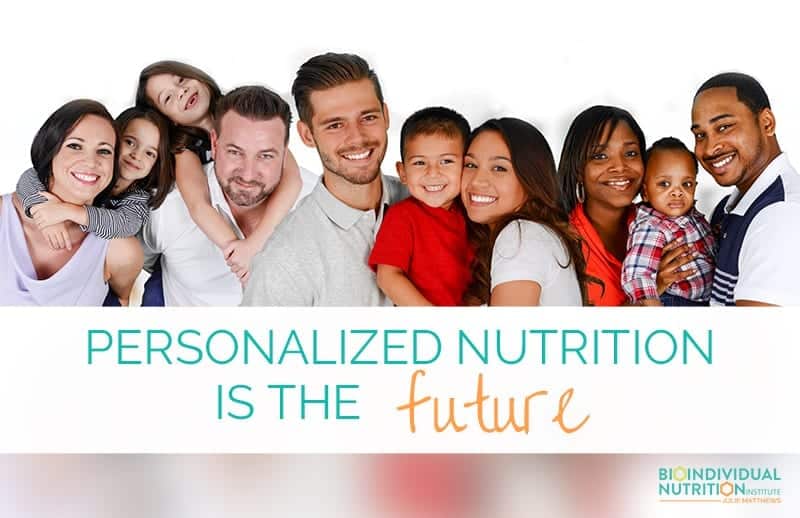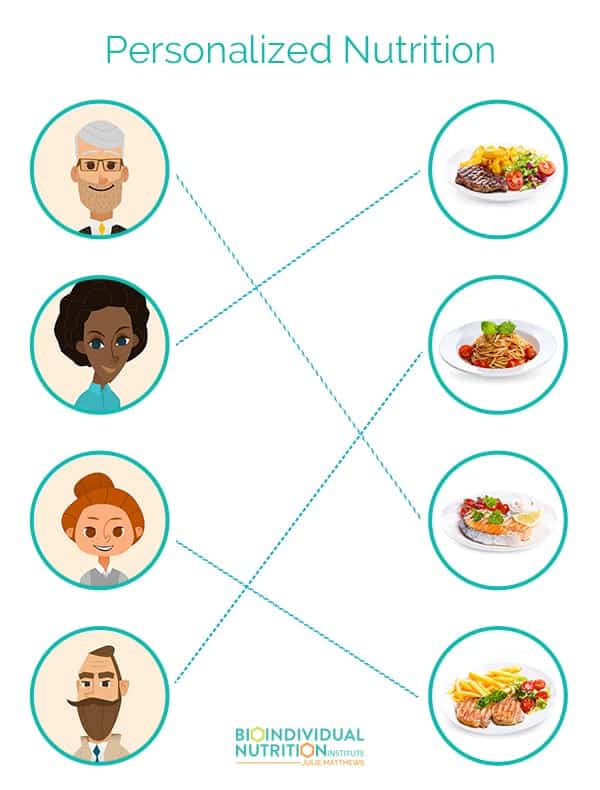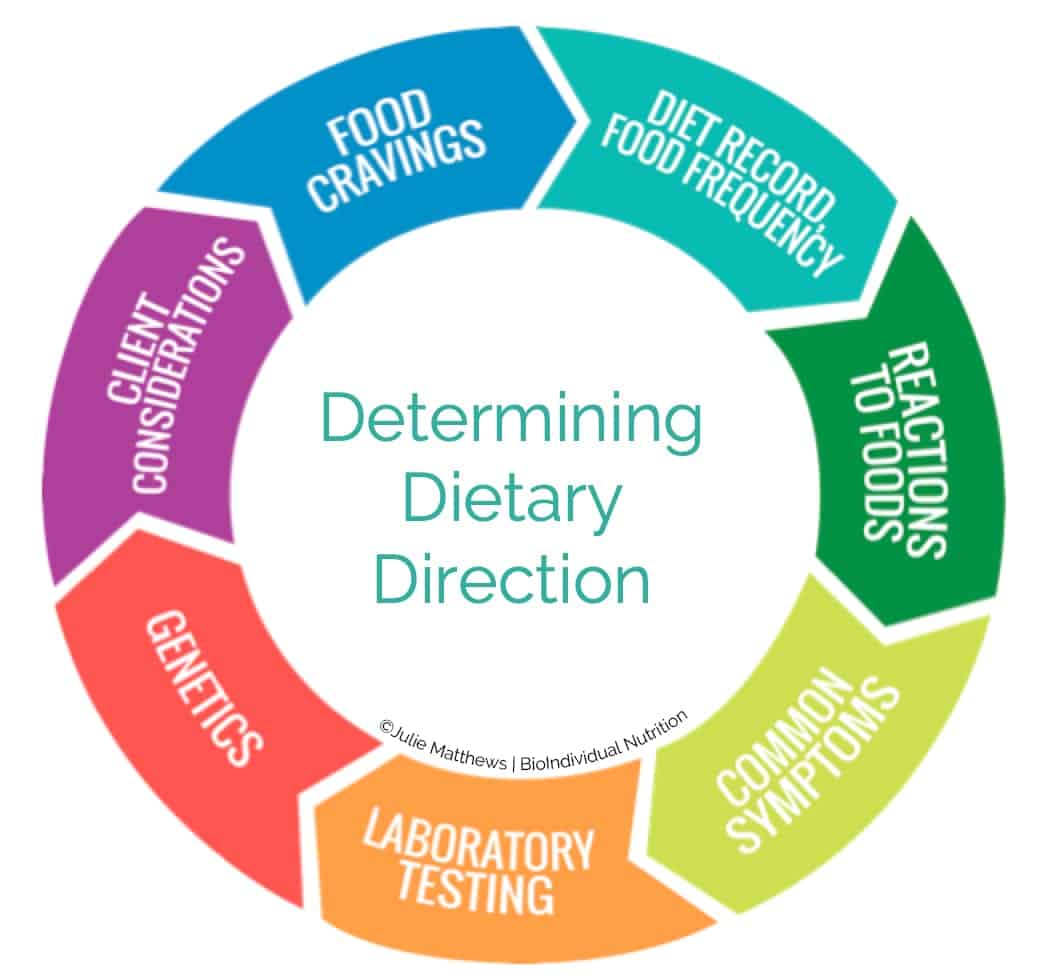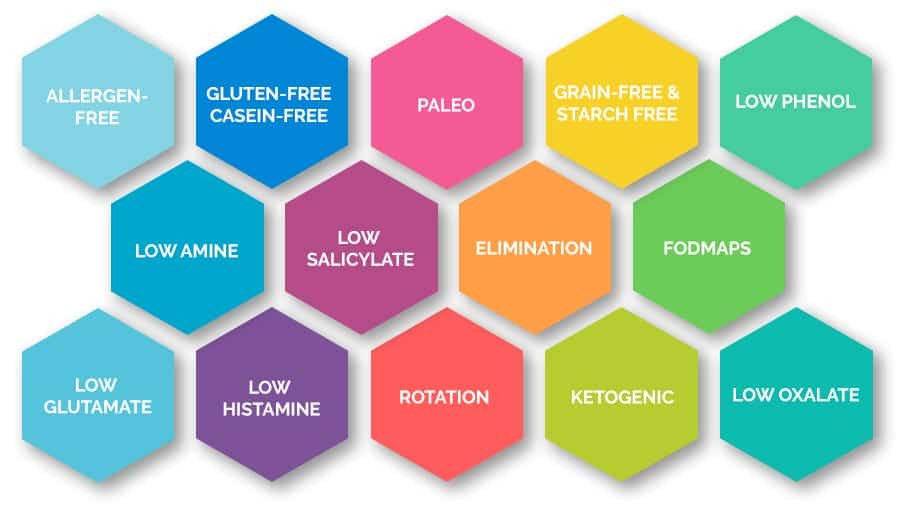
When they’re not well, there’s no time to waste on approaches that are not helpful.
So if your recommendations are “wrong,” they may lose confidence in you as a professional.
I believe that if you’re entrusted to give someone advice about what food and nutrition choices to be making – someone who’s in great pain, or their child has been suffering – you really want to be as “on target” as you can be.
Personalized nutrition, or BioIndividual Nutrition (my practice/methodology), is about customizing nutrition to the specific needs of each individual. Personalized nutrition is crucial to get the results you and your client want and need.
It’s becoming increasingly understood as the way to most effectively support the health and nutrition needs of people.
If you are a nutrition professional, you may have seen the positive results you get when you help a client find the right diet.
And if you’ve been practicing nutrition for years, you’ve likely seen this pattern emerge time and time again.
This has been my experience, which is why I developed this approach of personalized/bioindividual nutrition.
 Each person is unique. An individual has different genetics, prenatal nutrition, birth experience, childhood experiences, health history, pathogen exposure, diet, nutrient intake, and lifestyle. This means our genetics, biochemistry, metabolism, and microbiome are different.
Each person is unique. An individual has different genetics, prenatal nutrition, birth experience, childhood experiences, health history, pathogen exposure, diet, nutrient intake, and lifestyle. This means our genetics, biochemistry, metabolism, and microbiome are different.
That’s why our food and nutrition needs will be different, and our diet and nutrients needs to be individualized.
Functional medicine doctors, nutritionists and researchers are realizing that a personalized, bioindividual nutrition approach leads to the best results for clients and will be the way nutrition is practiced, now and into the future.
Personalized Nutrition and BioIndividual Nutrition
I was excited to read a recent position paper by The American Nutrition Association entitled “Toward the Definition of Personalized Nutrition: A Proposal by The American Nutrition Association”[1] because it explained the importance of utilizing Personalized Nutrition (PN) to support clients and patients optimally. It states:
“PN [Personalized nutrition] is a field with great potential to address chronic disease and optimize human health and performance.”
I couldn’t agree more! My work over the last 2 decades has validated the intricate interplay between our environment, individualized biochemistry, genetics, food, and nutritional factors in health conditions… and the need for bioindividual nutrition.
As a Certified Nutrition Consultant and published researcher specializing in autism and related childhood neurological disorders, I learned long ago that the approach most effective with my clients was a personalized, or BioIndividual Nutrition, approach. I found when I addressed the specific dietary and nutritional needs of the individual they improved significantly.
By specializing in one area, autism, I was able to dive deep and see hundreds of children with this condition and determine what approach was the best for the neurological, immune, and digestive difficulties/differences they had. This then allowed me to see how to apply food and nutrition strategies individually to each client.
I listened and observed how different diet strategies helped different people. I studied their symptoms, underlying biochemistry, observed their labs, nutrient deficiencies, genetics, family history. I studied the various diets and why they were purported to work.
After hundreds of client interactions, I observed patterns… patterns in their symptoms and certain food compounds, patterns in underlying biochemistry, laboratory test markers, and dietary needs, and patterns in what diets worked best and additional nutritional needs that required support.
For example:
 I’d discover one client did very well on a gluten-free and dairy-free diet; however, while another found small or moderate benefit from the diet.
I’d discover one client did very well on a gluten-free and dairy-free diet; however, while another found small or moderate benefit from the diet. - Yet, that second client had tremendous gains after adding a low salicylate diet.
- Someone else would tell me that the Specific Carbohydrate Diet or GAPS Diet did wonders for their child, while the next seemed to get worse on the same diet.
Because I had clients with the same condition coming to me using different diet approaches… and getting different results. I was able to see what was working for whom and why, and why certain approaches didn’t for an individual.
And after seeing how these same diets helped their parents, siblings, and relatives (with different conditions but with the same underlying factors)… it even further solidified that these principles can address the underlying factors causing most chronic disease.
Over many years I gained a body of knowledge that was helping people get better, so my fellow practitioners began to ask me to teach them what I know. This was how my BioIndividual Nutrition Institute was born.
BioIndividual Nutrition stems from the concept that no one size fits all – and therefore there is no one size fits all diet or nutrition plan. That is the foundation for my training program.
 I created the BioIndividual Nutrition Institute and the 6 Pillars of the BioIndividual Nutrition® Framework, a methodology to train practitioners in what I call “BioIndividual Nutrition®.” Practitioners learn how to apply dozens of different diet and nutrition strategies to the unique individual needs of the person.
I created the BioIndividual Nutrition Institute and the 6 Pillars of the BioIndividual Nutrition® Framework, a methodology to train practitioners in what I call “BioIndividual Nutrition®.” Practitioners learn how to apply dozens of different diet and nutrition strategies to the unique individual needs of the person.
Because this is a subject I am deeply passionate about, I wanted to share with you my thoughts on research and published papers into personalized nutrition.
Personalized Nutrition Research
In a recent paper in the Journal of the American College of Nutrition article by Bush, et al, the authors state:
“Personalized Nutrition Holds Tremendous Potential To Improve Human Health”
They describe how personalized nutrition has “come about relatively recently, is based in scientific evidence, relies on analytical technologies as well as the coaching of trained practitioners, and is multidisciplinary, drawing on knowledge from other fields such as genomics, epigenetics, systems biology, medicine, and behavioral sciences in addition to traditional nutrition science and clinical practice; and PN enables further tailoring of interventions to meet the needs of individuals or specific groups of people.”
The clinicians and researchers writing the paper explain that science and data of Personalized Nutrition fosters an “understanding about the impact of genetic, phenotypic, biochemical and nutritional inputs on an individual’s health.”
 They also mention that “biochemistry, metabolism, genetics, and microbiota contribute to the dramatic interindividual differences observed in response to nutrition, nutrient status, dietary patterns, timing of eating, and environmental exposures.”
They also mention that “biochemistry, metabolism, genetics, and microbiota contribute to the dramatic interindividual differences observed in response to nutrition, nutrient status, dietary patterns, timing of eating, and environmental exposures.”
This is true.
Chronic disease is typically caused by a combination of genetic predispositions and environmental assaults, and “Understanding Chronic Disease” from this perspective is the first pillar of BioIndividual Nutrition
And, nutrition is the link between our genes and our environment.

Environment
Environmental exposures such as chemicals, mold, infections, and toxins can create vulnerability, depletion of nutrients, and damage to a person.
Nutrition is key with environmental exposures. Nutritional deficiencies can cause us to be more damaged by toxins.
An interesting study on heavy metals and nutrition status highlights this well. Researchers found that, “Malnourished individuals, especially women of reproductive age and young children, may be more vulnerable to adverse health effects of chemical exposures.” [2]
In addition to causing depletion of nutrients, poor nutrition can cause us to be injured by toxins we might otherwise be able to handle. So environmental exposures can not only cause depletion, the depletion causes more damage from the toxins.
The interplay is important to understand, and well trained practitioners can use strategic nutrition as a way to help support the link between our genes and environment.
While we might not be able to change our genetics and our past environmental exposures. We can do something about our nutrition that can both overcome deficits and nourish the body so we can handle exposures and our biochemical situation better.
Genes
Genetics plays an important role in personalized nutrition. Your genes inform what you can eat and what you eat informs how your genes express themselves.
Nutrigenetics is the branch of science about how your specific genome should inform what and how to eat to maximize health
And nutrigenomics is the scientific study about how the foods you eat change how your genes are expressed.
Both of these areas are important for us to understand and consider as nutrition and health professionals when bioindividualizing diet and nutrition recommendations.
Personalized dietary intervention through the use of therapeutic diets tailored to the individuals genetics is crucial and can make a profound difference in healing.
In a paper by International Society of Nutrigenetics/Nutrigenomics (ISNN), they authors state “Individuals respond differently to lifestyle interventions, especially those modulating diet, because of genetic variants that influence how dietary components are absorbed, metabolized and utilized. Therefore, dietary advice that is specific to individuals with a particular genotype should be more effective at preventing chronic diseases than general recommendations about diet.” [3]
In another published paper, the authors explain why nutrigenomics is so important, “Nutrigenomics seems to be a promising approach to identify new biomarkers in nutrition, through an integrative application of transcriptomics, proteomics, metabolomics, epigenomics, and nutrigenetics in human nutritional research. [4]
The more we can identify the biomarkers and underlying factors affecting an individual’s nutrition and overall health, the more we can apply personalized nutrition.
Tailoring food and nutrition to the unique needs of the individual is a powerful link between our genes and environment.
We can take this even further by understanding the specific phenotype of the individual and other underlying factors that influence their condition.
BioIndividual Nutrition®
The BioIndividual Nutrition model includes personalizing nutrition based on:
 Inflammation
Inflammation- Immune Dysfunction
- Poor Digestion
- Microbiome
- Dysbiosis
- Poor Methylation
- Poor Transsulfuration
- Poor Sulfation
- Poor Detoxification
- Mitochondrial Dysfunction
- Cellular Metabolism
- Gene Expression.
All of these aspects are essential in the BioIndividual Nutrition methodology and taught at the BioIndividual Nutrition Institute Training program.
 Bioindividual Nutrition also takes into consideration the clients diet, nutrition, nutrient status, dietary patterns, toxin and infections, symptoms, and further considerations such as travel for a busy executive or picky eating in a child with autism.
Bioindividual Nutrition also takes into consideration the clients diet, nutrition, nutrient status, dietary patterns, toxin and infections, symptoms, and further considerations such as travel for a busy executive or picky eating in a child with autism.
Learn more about the BioIndividual Nutrition Institute and our training programs.
The BioIndividual Nutrition Training combines cutting edge nutritional science with tools and guides to improve your clinical success and save you time during consultations. You will dive deep into how to correct underlying imbalances seen in clients who have complex neurological and physiological needs such as gastrointestinal ailments, autoimmune disorders, autism, and anxiety.
You’ll be prepared with handouts, guides, questionnaires, and templates so that you know when and how to implement each advanced diet without guesswork.
The BioIndividual Nutrition Training program details dozens of therapeutic diets; explaining how to adapt for individual food allergies and sensitivities such as: gluten, dairy, salicylates, amines, histamines, glutamates, oxalates, and FODMAPS for clients with a wide variety of health conditions.
Our training includes a deep understanding of dozens of special therapeutic diets along with food lists and meal plans and implementation instructions and handouts to bioindividualize diet strategies.
Therapeutic Diets

Our Foundational Training is for practitioners that work with a wide range of disorders from autoimmune conditions to digestive disorders and who want to master the use of therapeutic diets to get breakthrough results with even the most complex clients.
Our Pediatric Nutrition Program consists of BOTH training courses (the Foundation training on all of the special diets for all chronic disease AND our Pediatric Intensive for those specializing in children and autism).
Personalized nutrition is the future of health care. Join over 800 practitioners from 49 countries that are practicing BioIndividual Nutrition.



